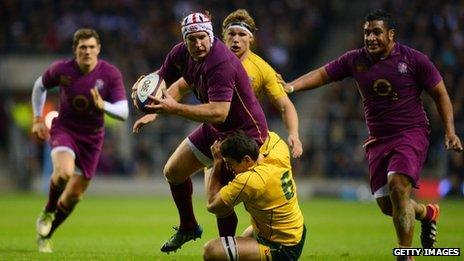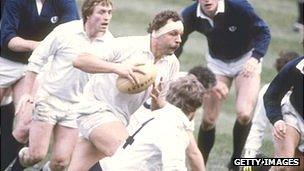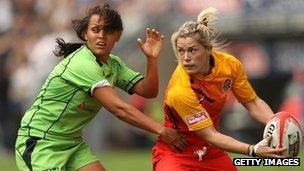Rugby union ready for World Cup and Olympics spotlight
- Published

England will host the Rugby World Cup over six weeks in late 2015
Few sports in the UK have been given the opportunity for growth that is being offered to rugby union in the middle of this decade.
The Rugby World Cup is being held in England in 2015, and the following year the sevens shortened version of the game makes its introduction in the 2016 Olympic Games in Rio de Janeiro.
The Rugby Football Union (RFU) hopes this double-header will provide the impetus to get more people involved in playing, and volunteering around, the game in England.
And there should also be a positive knock-on effect for the Scottish, Welsh and Irish rugby unions too.
The RFU is to invest £26m at grass-roots level to capitalise on a predicted increase in interest around the World Cup, with £1m being allocated to train 6,500 new referees and coaches and recruit 5,000 rugby volunteers by 2015.
Community involvement
"The Rugby World Cup is a fantastic opportunity for the game to be showcased - we will not see a[nother] World Cup here for a long time," says RFU chairman and former England captain Bill Beaumont.
He points out that despite great changes since his 1970s and 80s playing days, including the introduction of full professionalism, "community" clubs and volunteers remain at the heart of rugby union in England.

Bill Beaumont (with ball) has gone from playing to becoming a leading RFU administrator
"It is important for the RFU that we get involved with the community - get buy-in from clubs, provide facilities - to make sure that when a youngster turns up to play for the first time during the World Cup, we have the facilities and coaches to make them come back again and again," says Mr Beaumont.
Alastair Marks, head of rugby growth at the RFU, with responsibility for increasing participation in rugby, also believes the 2015 event is a fantastic chance to "drive the game forward".
And the former head of sports sponsorship for McDonald's says the inclusion of the sevens version of rugby union, where each team has just seven players, in the Olympics provides the opportunity to sell the sport to a wider global audience.
"My job is simple. We have got to get more people playing the game, and keep those [already] in the game for the long term," he says, speaking at the annual Rugby Expo event at Twickenham Stadium in London.
Schools initiative
Mr Marks says that rugby union is no different from a big brand, in having to "entice" people to sample its product.
But he points out that rugby union has one great advantage - a very focused volunteer base already in place and willing to help sell the sport.
Despite that, he says that rugby has to start preparing now for the projected growth and added interest that is expected in 2015 and 2016.
Mr Marks believes the game cannot be passive and wait for these two big events to arrive, but has to be pro-active, for example getting itself into more secondary schools and universities. He hopes to see rugby union introduced and being played in an extra 400 secondary schools by 2015.
In addition, the predicted expansion of the game must include women and girls becoming "fully integrated" at all levels of the sport, including not just playing but also administration.
"We are also looking to grow the game in areas where it is no longer played, or where it has never been played," he adds.
Meanwhile, the existing volunteer base must be grown and encouraged, the quantity and standard of referees increased, and facilities improved.
"We have to look at ways of modernising facilities, but not doing away with our heritage," says Mr Marks.
'Sevens opportunity'
A pot of some £10m is being made available to 500 clubs, for things like playing kit and equipment, installing floodlights, improving pitches - including providing all-weather playing surfaces, and new changing rooms and social facilities.

Women's and sevens rugby union are both growing in popularity
"We are building a game to be genuinely sustainable and fit for the future," Mr Marks says. "If we can meet people's needs they will come back... and then bring their friends."
On the playing side, it is also hoped to bring in more participants by promoting other forms of the game, such as sevens, or touch rugby.
In 2013 the RFU and one of its sponsors, O2, will be rolling out a new touch programme.
And, much as the Twenty20 form of the game has done for cricket, it is hoped that sevens can attract new players and a new audience in the run up to Rio 2016, not just in the UK, but also around the globe.
"Having rugby at 2016 has certainly been one of the most transformational decisions," says the International Rugby Board's Mark Egan, who points out that there are potentially 205 national Olympic committees who might now take up the game.
"We see sevens as the biggest opportunity throughout the game - particularly for women - and as a natural entry point [to rugby union]."
He said that countries such as the US, Brazil and Netherlands had all been expanding their sevens programmes.
As former England player and captain Lawrence Dallaglio points out, the traditional 15-a-side format is "an international game", but the sevens version has the chance to become "a truly global game".
"This is a very good time for rugby, here and in other parts of the world," adds Mr Dallaglio, a member of England's 2003 World Cup winning team, who saw at first hand the added interest in the sport that victory brought.
"We need to start preparing for 2015 now - we need to start engaging with people now."